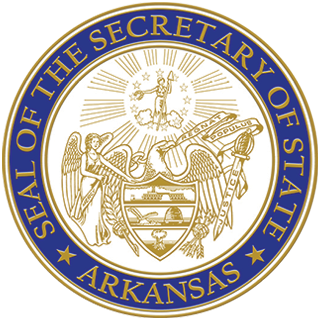State Governors 1885-1901
State Governors 1885-1901
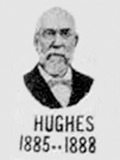 Simon P. Hughes
Simon P. Hughes
Born: April 14, 1830, near Carthage, Tennessee
Died: June 29, 1906, at Little Rock, Arkansas
Buried: Mount Holly Cemetery, Little Rock
Served: 1885-1889
Arkansas's 15th governor was born and educated in Tennessee, where he attended Clinton College. In 1849 Hughes moved to Arkansas and 1853 entered politics as sheriff of Monroe County, where he served for two years. While sheriff, Hughes studied law, was admitted to the Arkansas bar in 1857, and started a private practice in Clarendon. Although a Unionist Democrat, Hughes enlisted in the Confederate army and was commissioned as a captain, rising to the rank of lieutenant colonel... He was a delegate to the 1874 Arkansas Constitutional Convention, and Arkansas' attorney general from 1874 to 1877. In 1884 Hughes was elected Governor and was re-elected to a second term in 1886. During his administration, the Arkansas Industrial University was reorganized, the office of state geologist was created, and public executions were abolished. The State Debt Board was formed to help reduce the state's indebtedness without impairing its ability to conduct business and meet its current bills. Additionally, limitations were imposed on the sale of intoxicants within three miles of any school. Hughes stood for a third term but was narrowly defeated in the primary. After leaving office in 1889 he was elected to the Arkansas Supreme Court as an associate justice and re-elected in 1896. He served nearly 16 years on the bench. He died in Little Rock and is buried at the Mount Holly Cemetery, Little Rock, Arkansas.
James Philip Eagle
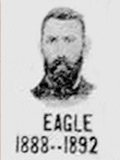 Born: August 10 1837, in Maurin County, Tennessee
Born: August 10 1837, in Maurin County, Tennessee
Died: December 20, 1904, at Little Rock, Arkansas
Buried: Mount Holly Cemetery, Little Rock
Served: 1889-1893
Born in Tennessee, James Eagle's family moved to Pulaski County in 1839. Eagle was educated in the county schools, farmed and in 1859 was appointed deputy sheriff of Prairie County. Eagle held this position until the start of the Civil War, when he enlisted as a private, and rose later to the rank of colonel. After the war, Eagle farmed, was ordained a Baptist minister and briefly attended Mississippi College. He entered politics as a member of the Arkansas Legislature, serving from 1873 to 1878, and in 1885, he served as speaker of the house. He also served as president of the Arkansas Baptist Convention from 1880 to 1904. Eagle was nominated by the Democratic State Convention for governor in 1888, and was elected, although charges of fraud clouded his victory. During his first term Eagle advocated more equitable taxation, effective railroad regulation, penitentiary reforms and generous support for education. Re-elected in 1890, Eagle continued to support these measures and signed into law Arkansas's "separate coach act," which mandated segregated traveling accommodations for white and black passengers. After leaving office, Eagle continued his long work with the Southern Baptist churches, retiring from the presidencies of the Arkansas Baptist and Southern Baptist Conventions in 1904. He also sat on the capital commission but was fired by Governor Jeff Davis, after being charged with campaigning for one of the governor's opponents. He died of heart failure in late 1904, in Little Rock.
William Meade Fishback
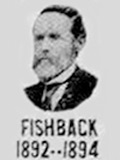 Born: November 5, 1831, at Jeffersonton, Virginia
Born: November 5, 1831, at Jeffersonton, Virginia
Died: February 9, 1903, at Fort Smith, Arkansas
Buried: Oak Cemetery, Fort Smith
Served: 1893-1895
William Fishback graduated from the University of Virginia in 1855, studied law, and then moved to Illinois where he was admitted to the bar in 1857. After a year of practicing law Fishback relocated to Greenwood, Arkansas, and entered into a partnership with Judge Solomon F. Clark. In 1861 he was elected as a Union sympathizer to the state convention yet voted for the secession ordinance (so, go figure!). After secession Fishback left the state, returning in 1863 to establish a Unionist newspaper and, later, recruit about 900 men for the Fourth Arkansas Cavalry. He entered politics in 1864, when he was elected to the U.S. Senate, but was not allowed to take his seat, along with several other representatives from ex-Confederate states. Fishback was a delegate to the 1874 Arkansas Constitutional Convention, and was a member of the Arkansas Legislature from 1871 to 1881. He introduced what is known as the "Fishback Amendment" to the state constitution, which prohibited the state authorities from paying on much of its bonded indebtedness, including the so-called "Holford" bonds, as well as Reconstruction-period railroad aid and levee bonds. For this advocacy, Fishback won (and bore proudly) the sobriquet of "the great repudiator." On September 5, 1892, he was elected Arkansas's 17th governor, and during his tenure, the St. Francis levee district was organized. As governor, Fishback did little to guide the Legislature, but instead sought to enhance the national image of Arkansas with the state's acclaimed pavilion at the Columbian Exposition of 1893 and other similar public relations activities. He left office in January 1895, and continued his work in promoting Arkansas's industrial growth while practicing law in Fort Smith until his death in 1903.
James Paul Clarke
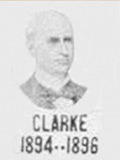 Born: August 19, 1854, in Yazoo County, Mississippi
Born: August 19, 1854, in Yazoo County, Mississippi
Died: October 1, 1916, at Little Rock, Arkansas
Buried: Oakland Cemetery, Little Rock
Served: 1895-1897
Arkansas's 18th governor graduated from the University of Virginia in 1878 with a degree in law. He moved to Arkansas in 1879, and started a successful practice in Helena. He was elected to the Arkansas House of Representatives in 1886, the State Senate in 1888 and successfully sought the office of Attorney-General in 1892 and the governorship in 1894. During his tenure, Clarke advocated four-year terms for state and county offices, quadrennial instead of biennial sessions for the general assembly, and a constitutional provision for a tax on franchises; however, the legislature did not pass any of these bills. Clarke met with more success in supporting railroad rate regulation and in negotiating an agreement with the federal government over debts owed it by the state of Arkansas. In addition, while known for having a volatile and sometimes violent temper, he crusaded to prevent prizefighting in Arkansas, threatening to use the militia to stop such events. Clarke did not seek re-election, but instead ran unsuccessfully for the U.S. Senate in 1896. He ran again in 1902, and this time he was elected. Clarke won re-election in 1908, and again in 1914; he was known for his independent streak and his frequent support of progressive legislation, often at odds with the Democratic leadership.
Daniel Webster Jones
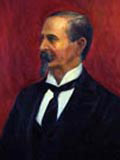 Born: December 15, 1839, in Bowie County, Texas
Born: December 15, 1839, in Bowie County, Texas
Died: December 25 1918, in Little Rock, Arkansas
Buried: Oaklawn Cemetery, Little Rock
Served: 1897-1901
Arkansas's 19th governor was born in Texas but in 1840 his family moved to Washington, Arkansas, where Jones attended Washington Academy and later studied law. During the Civil War, Jones enlisted in the Third Arkansas (Confederate) Infantry, was wounded in battle, became a prisoner of war, and later rose to the rank of colonel. Jones finished his law studies and was admitted to the Arkansas Bar in 1865; in the next year he was named prosecuting attorney for Hempstead County. Jones was elected prosecuting attorney of the Ninth Judicial Circuit in 1874, attorney general in 1884 and 1886, and Pulaski County's representative in the Arkansas House of Representatives in 1890. In September 1896 he was elected governor. In his first term Jones supported electoral reforms, creation of a state railroad commission and construction of a separate juvenile reform school, among other measures; in most instances, the legislature's enactments fell short of Jones's suggestions. He was re-elected to a second term in 1898. During his second term money was appropriated for a new state capitol, voters approved a constitutional amendment creating a state railroad commission and the legislature enacted a state-level anti-trust act. After leaving office, Jones resumed his law practice in Little Rock and was elected in 1914 to the Arkansas House of Representatives.



